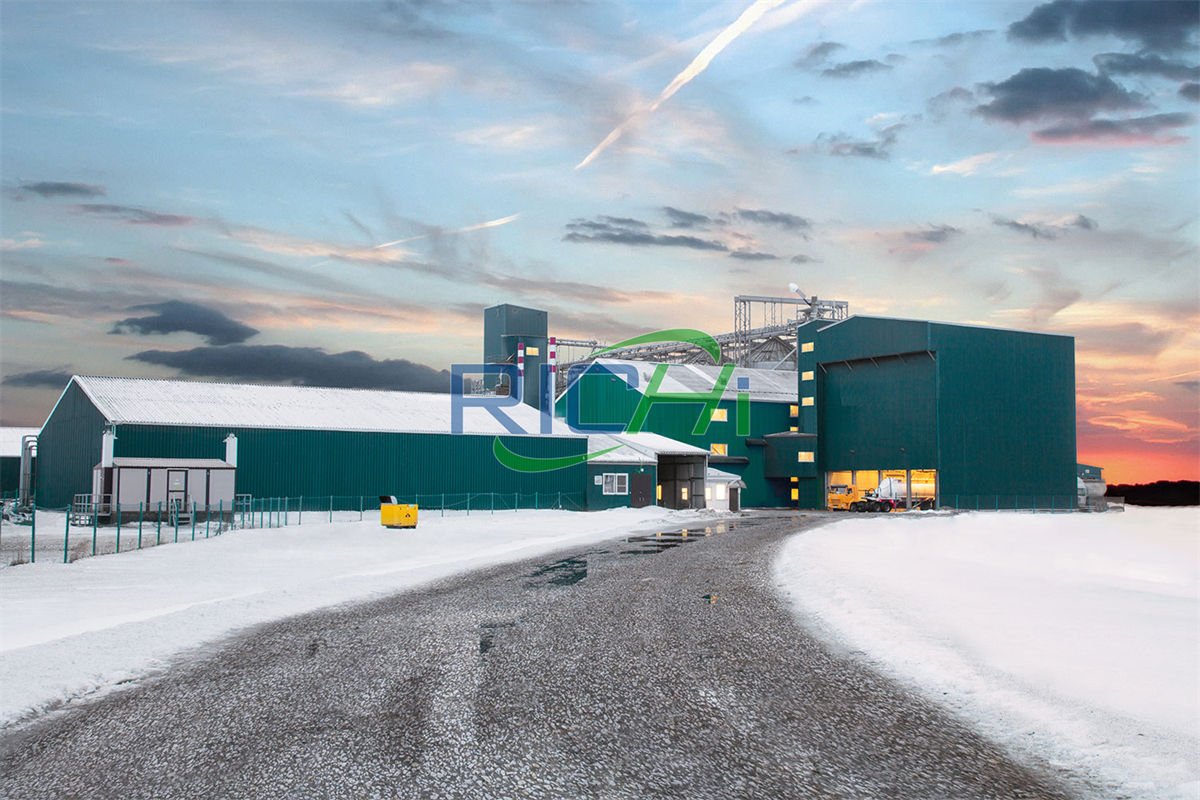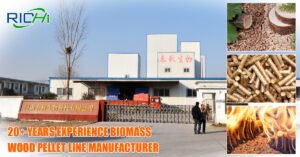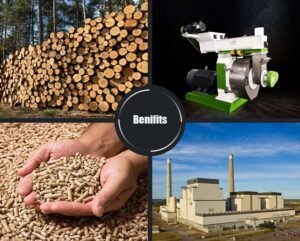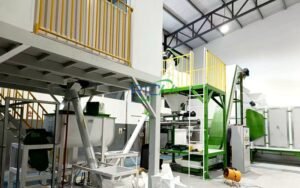
In the dynamic landscape of the poultry industry, the importance of providing high-quality and nutritionally balanced feed cannot be overstated. Proper nutrition is essential for maintaining the health, growth, and productivity of various poultry species, which play a vital role in meeting the global demand for meat, eggs, and other poultry products. To support this crucial industry, specialized poultry feed production lines have emerged, offering a comprehensive solution for efficient and sustainable poultry feed manufacturing.
The Significance of Poultry Nutrition
Poultry nutrition is a complex and multifaceted discipline, as different avian species have unique nutritional requirements and physiological characteristics. Providing a balanced and complete diet is essential for maintaining poultry health, promoting optimal growth and development, and supporting successful egg production and meat yield. The significance of poultry nutrition extends beyond mere sustenance, as it contributes to:
- Meat and Egg Production: Adequate nutrition is crucial for ensuring optimal growth rates, carcass quality, and egg production in poultry, directly impacting the yield and quality of poultry products.
- Animal Health and Welfare: A well-balanced diet helps maintain a strong immune system, reduces the risk of metabolic disorders, and promotes overall bird well-being, contributing to the sustainability and productivity of poultry operations.
- Reproductive Performance: Proper nutrition is vital for successful breeding, ensuring proper egg production, hatchability, and chick development, supporting the long-term viability of poultry flocks.
- Environmental Sustainability: Efficient poultry nutrition can contribute to reducing the environmental impact of poultry production by optimizing feed conversion rates and minimizing waste.
- Economic Viability: Optimizing poultry nutrition through balanced feed formulations can improve feed efficiency, reduce production costs, and enhance the overall profitability of poultry operations.
The Role of Poultry Feed Production Lines
Poultry feed production lines play a crucial role in supporting the poultry industry by manufacturing high-quality, nutritionally balanced feed formulations tailored to the specific needs of various poultry species. These specialized systems offer numerous benefits:
- Consistent Product Quality: Poultry feed production lines utilize advanced technologies and quality control measures to produce feed with consistent nutrient profiles, ensuring optimal poultry health and performance.
- Customized Formulations: These systems can manufacture feed formulations tailored to the specific nutritional needs of different poultry species, life stages, and production systems, optimizing growth, egg production, and overall productivity.
- Efficient Production: Modern poultry feed production lines are designed for efficient and cost-effective production, leveraging automation and process optimization to maximize output and minimize waste.
- Sustainability: Poultry feed production lines can incorporate sustainable practices, such as the use of alternative protein sources, waste reduction strategies, and energy-efficient technologies, promoting environmental responsibility within the poultry industry.
- Economic Opportunities: Investing in poultry feed production lines can create employment opportunities, stimulate local economies, and contribute to the overall growth and development of the poultry sector.
Key Components of Poultry Feed Production Lines
A successful poultry feed production line requires the integration of various components to ensure efficient and sustainable production. The key components of a typical poultry feed production line include:
- Raw Material Handling and Storage: Facilities for receiving, storing, and handling raw materials such as grains, oilseeds, protein sources, vitamins, and minerals are essential for ensuring a consistent supply of high-quality ingredients.
- Grinding and Mixing: Advanced grinding and mixing equipment is necessary to achieve the desired particle size and homogeneous distribution of ingredients in the poultry feed formulation.
- Pelleting and Extrusion: Pelleting and extrusion systems are crucial for producing high-quality, durable feed pellets or extruded products that can withstand handling, storage, and transportation without compromising nutritional value.
- Drying and Cooling: Efficient drying and cooling systems are required to remove excess moisture from the poultry feed products, ensuring their stability and prolonging their shelf life.
- Quality Control and Testing: Comprehensive quality control measures, including laboratory testing and analysis, are essential to ensure that the final poultry feed product meets stringent nutritional and safety standards.
- Packaging and Storage: Appropriate packaging and storage facilities are necessary to maintain the quality and integrity of the poultry feed during transportation and distribution.
- Automation and Process Control: Advanced automation and process control systems are integrated into poultry feed production lines to ensure consistent product quality, maximize efficiency, and minimize downtime.
- Auxiliary Systems: Poultry feed production lines also require auxiliary systems such as material handling equipment, dust collection systems, process control systems, and utilities to ensure efficient and safe operations.
Related post: https://www.richipelletmachine.com/livestock-feed-production-line/
Factors Influencing Poultry Feed Production Line Success
The success of a poultry feed production line operation is influenced by several critical factors, including:
- Raw Material Sourcing and Supply Chain Management: Securing a reliable and cost-effective supply of high-quality raw materials is crucial for consistent poultry feed production and profitability.
- Formulation Expertise: Employing skilled avian nutritionists and feed formulators is essential to develop balanced and optimized poultry feed formulations that meet the specific nutritional requirements of various poultry species, life stages, and production systems.
- Technology and Automation: Investing in advanced technologies and automation systems can enhance production efficiency, reduce labor costs, and improve product quality and consistency.
- Energy Efficiency and Sustainability: Incorporating energy-efficient technologies and sustainable practices, such as waste reduction strategies and renewable energy sources, can reduce operational costs and minimize the environmental impact of the poultry feed production line operation.
- Regulatory Compliance: Ensuring compliance with relevant regulations and standards related to feed safety, quality, and environmental protection is essential for the long-term viability of the poultry feed production line operation.
- Skilled Workforce and Training: Employing a skilled and well-trained workforce is crucial for the efficient operation and maintenance of the poultry feed production line facility, ensuring optimal performance and minimizing human errors.
- Continuous Improvement: Implementing a culture of continuous improvement, including regular equipment upgrades, process refinements, and the adoption of new technologies, can drive long-term efficiency gains and maintain competitiveness in the poultry feed market.
Opportunities and Future Outlook
As the global demand for poultry products continues to rise, the poultry industry is poised for significant growth, creating numerous opportunities for poultry feed production lines. The future outlook for this sector is promising, driven by factors such as:
- Increasing Poultry Production: The growing global population and rising demand for affordable and sustainable sources of animal-based proteins are expected to drive the expansion of poultry operations, consequently increasing the demand for high-quality poultry feed.
- Technological Advancements: Ongoing research and development in areas such as avian nutrition, ingredient optimization, and production processes will contribute to the development of more efficient and innovative poultry feed products.
- Sustainable Practices: The adoption of sustainable practices, such as the use of alternative protein sources, waste reduction strategies, and renewable energy sources, will become increasingly important in the poultry feed industry.
- Precision Poultry Farming: The integration of precision poultry farming techniques, including individualized feeding strategies and real-time monitoring, will drive the need for specialized poultry feed formulations tailored to specific production systems and bird requirements.
- International Collaboration and Investment: Increased international collaboration and investment in the poultry sector will drive the development of new poultry feed production lines, fostering economic growth and technological advancements.
In conclusion, poultry feed pellet production lines play a crucial role in supporting the growth and sustainability of the poultry industry. By investing in these specialized systems, stakeholders can contribute to meeting the rising global demand for poultry products while promoting sustainable practices and economic development. As the world continues to recognize the importance of efficient and responsible poultry production, poultry feed production lines will remain at the forefront of this vital industry, fueling its growth and driving innovation for a more prosperous and responsible future.




